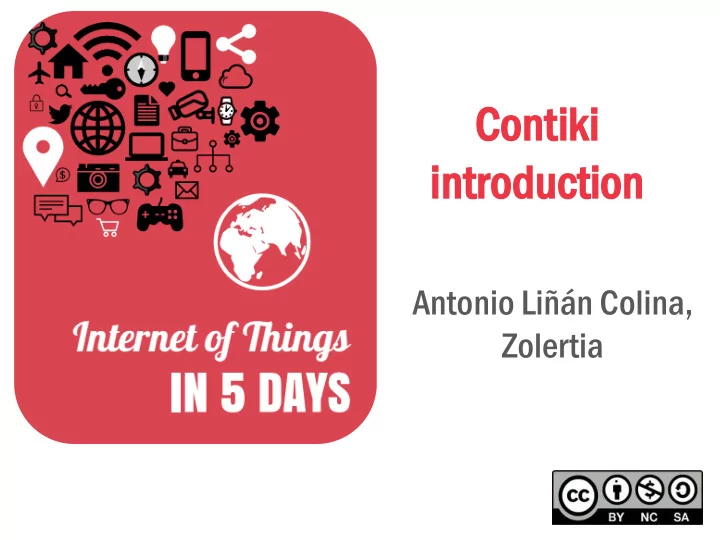

Co Cont ntiki iki int ntroduction oduction Antonio Liñán Colina, Zolertia
Internet Low Power (Open Protocols) (years on batteries) Wireless (farther the better)
Internet Open Low Power Source (Open Protocols) (years on batteries) < €€€ Wireless (farther the better)
Processing power 200-500 mA @ 5V 1 – 2.5 Watts USB power bank 7Ah 19.6 hours DietPi build 16MB RAM (1GB available) Typical application: 50KB (0.005%) Unused System Required http://fuzon.co.uk/phpbb/viewtopic.php?f=8&t=6 http://www.digikey.com/en/resources/conversion-calculators/conversion-calculator-battery-life
30m http://www.digikey.com/en/resources/conversion-calculators/conversion-calculator-battery-life
40.5 mA (avg) @ 5V 225mW USB power bank 7Ah 121h (5 days) http://www.ubidots.com/ https://www.particle.io/ https://www.hackster.io/4354/potato-powered-iot-947b69
* Commercial solutions without special antennas http://www.atmel.com/
2.6 mA (avg) @ 5V 13 mW USB power bank 7Ah 1884h (78,5 days) http://zolertia.io/ http://www.ubidots.com/ https://www.hackster.io/4354/potato-powered-iot-947b69
Zolertia RE-mote prototype A 868MHz, 3.14Km @50Kbps IEEE 802.15.4g, 2dBi omni http://zolertia.io/ https://ict-rerum.eu/first-long-range-test-with-the-rerum-re-mote-platform/
Zolertia Z1 mote 2.4Ghz, 284 m @250Kbps IEEE 802.15.4 3dBi omni + 12dBi directional http://zolertia.io/
RAM ROM/FLASH Processor > 1MB RAM/ROM
• Architectures: 8-bit, 16-bit, 32-bit • Open Source (source code openly available) • IPv4/IPv6/Rime networking • Devices with < 8KB RAM • Typical applications < 50KB Flash • Vendor and platform independent • C language • Developed and contributed by Universities, Research centers and industry
http://www.tado.com http://www.lifx.com http://cetic.github.io/6lbr/
www.contiki-os.org https://github.com/contiki-os/contiki
INSTANT ANT CONTIK TIKI VMWare virtualized develop environment user http://www.contiki-os.org/start.html
If you are using a laptop/PC and have a 32-bit Linux machine sudo add-apt-repository ppa:wireshark-dev/stable sudo apt-get – y install git git-core build-essential wireshark git clone – recursive https://github.com/alignan/contiki git checkout zolertia-tutorial To install the toolchain (application to convert the source code into an image to program the Zolertia devices) wget "https://sourceforge.net/projects/zolertia/files/Toolchain/msp430-47.tar.gz" -O $HOME/msp430-47.tar.gz && tar -zxvf $HOME/msp430-47.tar.gz -C $HOME/msp430-47 sudo echo "export PATH=$HOME/msp430-47/bin:$PATH" >> $HOME/.bashrc && source $HOME/.bashrc
MCU implementation (MSP430) Devices implementation (radio, etc) (CC2420) Examples (ipv6, Zolertia, etc) Platform specific implementation (Z1, Zoul) Tools (flashing, emulation, visualization)
Specific Z1 applications Specific sensors and actuators drivers Makefiles (where the platform specifies the files to use and include) Specific configuration for Contiki Main Application, Z1 initialization when booting Specific platform configuration (pin-out, peripherals)
https://sourceforge.net/projects/zolertia/files/Toolchain/
01 01-basics basics
Fixes a problem related to being allowed to write to USB ports as the /dev/ttyUSB0 used to flash the nodes sudo usermod -a -G dialout user For the change to take effect, you need to logout and log back in
examples/zolertia/tutorial/01-basics/01-hello-world.c
To compile an application and program the nodes: make TARGET=z1 hello-world.upload You can save the TARGET so next time you don’t have to type it: make TARGET=z1 savetarget This will create a Makefile.target file, for the compiler to know which platform to compile for, if no TARGET argument is added in the compilation command line
Shows a list of connected devices and USB ports make z1-motelist Restarts the devices make z1-reset Opens a serial connection and prints debug output make login As “ make login ” but with a timestamp make serialview If there are more than one device connected, use MOTES=/dev/ttyUSBx to choose which one to command, else the above commands will be executed on all connected devices
examples/zolertia/tutorial/01-basics/01-hello-world.c
examples/zolertia/tutorial/01-basics/01-hello-world.c
Bu Buttons ons and d LE LEDs Events and actions can be triggered by pressing the user button: send a message over the radio, take a sensor sample, start a process, etc. The LEDs (light-emitting diodes) help us to understand what happens in the mote, by using different colours and blinking sequences we know when an event is happening, if there are any errors or what happens in our application.
Buttons: User & Reset LEDs: Red, Blue, Green examples/zolertia/tutorial/01-basics/02-led-and-button.c
Tim imer ers Timers allow to execute actions periodically, like measuring a sensor periodically, waiting a few seconds before executing a function, etc.
Tim imer ers • Timer: ms, manual • Stimer: seconds, manual • Etimer: ms, triggers an event • Ctimer: ms, callbacks • Rtimer: us, callbacks examples/zolertia/tutorial/01-basics/03-timers.c
Processes sses Contiki has two execution contexts: cooperative and preemptive Processes are cooperative and sequential, interrupts (button, sensors events) and the real- timer are preemptive. examples/zolertia/tutorial/01-basics/04-processes.c https://github.com/contiki-os/contiki/wiki/Processes
examples/zolertia/tutorial/01-basics/04-processes.c https://github.com/contiki-os/contiki/wiki/Processes
Se Sensor ors A sensor is a transducer whose purpose is to sense or detect a characteristic of its environment, providing a corresponding output, generally as an electrical or optical signal, related to the quantity of the measured variable
TMP102: temperature ADXL345: acceleration(3 axis) examples/zolertia/tutorial/01-basics/05-onboard-sensors.c
An Antonio onio Li Liñán án Colina lina alinan@zolertia.com antonio.lignan@gmail.com Twitter: @4Li6NaN LinkedIn: Antonio Liñan Colina github.com/alignan hackster.io/alinan
Recommend
More recommend